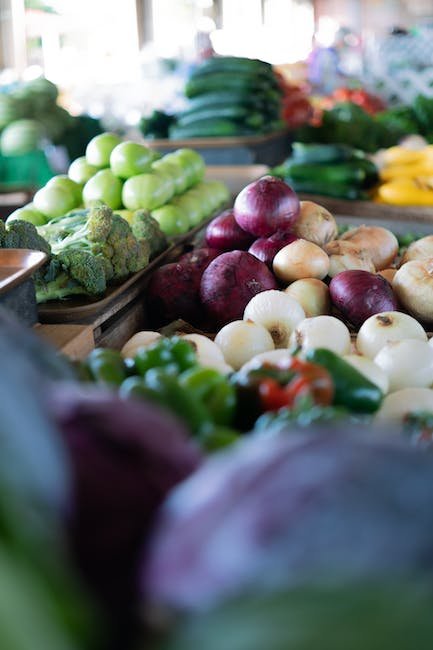In a time when the world seems to rely heavily on mass-produced, impersonal goods, there is a growing yearning for a return to roots, to connect with the source of our sustenance. Luckily, there is a solution just around the corner – quite literally! Collaborating with local farmers not only satisfies our cravings for fresher, healthier produce, but it also strengthens the bonds within our communities. However, navigating this collaboration can be daunting for those unfamiliar with the territory. Fear not, as we have crafted a comprehensive guide to help you traverse this fruitful path and collectively sow the seeds of a robust local farm partnership. From building relationships with farmers to reaping the benefits of sustainable agriculture, this article will equip you with the knowledge and tools you need to collaborate with local farmers in a seamless and mutually beneficial manner. So, grab your gardening gloves, unleash your inner forager, and let’s delve into the world of farm-to-table collaboration like never before!
Table of Contents
- Finding local farmers in your area
- Understanding the benefits of collaborating with local farmers
- Building strong relationships with local farmers
- Negotiating fair trade practices and prices
- Promoting your collaboration with local farmers
- Q&A
- In Conclusion

Finding local farmers in your area
Are you looking to connect with local farmers in your area? Supporting local agriculture not only helps to build a sustainable community but also allows you to enjoy fresh, tasty produce right from the source. Here are a few tips to help you find and connect with local farmers near you:
- Explore Farmers Markets: Farmers markets are a treasure trove of local produce, and a great place to meet farmers face-to-face. Stroll through the colorful stalls, strike up conversations with farmers, and learn about their farming practices. You might even find unique varieties of fruits and vegetables that you won’t find in grocery stores.
- Join Community-Supported Agriculture (CSA) Programs: CSA programs offer a direct connection between farmers and consumers. By becoming a member, you can receive a weekly or bi-weekly share of fresh, seasonal produce directly from the farm. It’s a fantastic way to support local farmers and enjoy a wide variety of produce throughout the growing season.
- Utilize Online Directories: The internet has made it easier than ever to find local farmers in your area. Visit online directories that specialize in connecting consumers with local agricultural producers. These directories often provide detailed information about farmers, their products, and even their farming practices, allowing you to make informed choices.
By taking the time to connect with local farmers, you not only support the local economy but also gain access to delicious, high-quality food. So, don’t hesitate to explore farmers markets, join CSA programs, and make use of online resources to discover the wonderful world of local farming in your area.

Understanding the benefits of collaborating with local farmers
When it comes to sourcing ingredients for your business, collaborating with local farmers can provide a multitude of benefits. Here are a few reasons why partnering with these hardworking individuals can be advantageous:
- Freshness and Quality: By working with local farmers, you can ensure that the produce and other agricultural products you receive are fresh and of high quality. Close proximity allows for quicker transportation, minimizing the time between harvesting and delivery. This means your customers can enjoy the juiciest fruits, the crispiest vegetables, and the most flavorful herbs.
- Sustainability: Collaborating with local farmers supports sustainable practices and helps in reducing your carbon footprint. These farmers often employ environmentally-friendly methods, such as organic farming or rotational grazing, that prioritize the health of the land and animals. By promoting local agriculture, you contribute to the preservation of the surrounding ecosystems.
- Community Connection: Partnering with local farmers strengthens your ties with the community. By sourcing your ingredients locally, you are supporting local businesses and contributing to the economic growth of your area. It also allows you to engage in a closer relationship with the people who grow your food, fostering a sense of transparency and trust between you and your suppliers.
Collaborating with local farmers is not just about benefiting your business; it is also about promoting sustainable practices and supporting local economies. By prioritizing freshness, quality, and community connection, you can enhance your products and contribute to a better future for all.

Building strong relationships with local farmers
One of our core values is our commitment to . We believe that by partnering with these hardworking individuals, we can not only support the local economy but also ensure that our customers receive the highest quality and freshest produce possible.
At our farm-to-table restaurant, we go beyond just sourcing our ingredients locally. We actively engage with farmers in our community, taking the time to visit their farms, understand their practices, and learn about the passion and craftsmanship behind their products.
Why do we prioritize local farmers?
- Supporting the local economy: By working closely with local farmers, we contribute to the growth and sustainability of our community.
- Fresher and healthier ingredients: By sourcing locally, we reduce the transportation time between the farm and our kitchen, ensuring that our ingredients are at their peak flavor and nutritional value.
- Sustainable farming practices: Local farmers often prioritize sustainable farming methods, such as organic or regenerative practices, which align with our commitment to environmental stewardship.
- Preserving food diversity: By supporting local farmers, we help maintain a diverse range of crops and varieties, safeguarding our food heritage and promoting biodiversity.
By , we not only create a more connected and resilient food system but also have the opportunity to share the stories and passion behind the ingredients on our menu. We believe that these personal connections with our food sources elevate the dining experience for our customers and highlight the incredible work done by our local farming community.
Negotiating fair trade practices and prices
When it comes to fair trade practices and prices, negotiation plays a crucial role in establishing equitable agreements between parties. Effective negotiation not only ensures fairness but also promotes sustainable relationships and economic growth. Here are some strategies to consider:
- Research: Before entering into negotiations, it is essential to gather relevant market information, such as pricing trends, competitors’ strategies, and consumer demands. Armed with comprehensive data, you can better understand the market landscape and make informed decisions during the negotiation process.
- Identify common interests: During negotiations, it’s important to find common ground between you and the other party. By identifying shared interests, you can work towards mutual benefits and foster a cooperative environment. This approach encourages transparency, trust, and collaboration.
- Offer alternatives: If price becomes an obstacle in negotiations, explore alternative solutions that could be mutually advantageous. This can include introducing value-added services, adjusting payment terms, or finding alternative products within a similar price range. Be willing to think creatively and explore options that satisfy both parties.
Remember, effective negotiation involves open communication, active listening, and a willingness to compromise. By adhering to fair trade practices and finding mutually agreeable prices, we can establish sustainable partnerships that benefit all parties involved.
Promoting your collaboration with local farmers
Your collaboration with local farmers is not only beneficial for your business but also for the community. By supporting local farmers, you are contributing to the sustainability of the local economy and promoting the consumption of fresh, locally sourced products. Here are some effective ways to promote your collaboration and showcase the value of local farming:
- Highlight local produce: Create a dedicated section in your store or on your website to showcase the diverse range of fruits, vegetables, and other farm products you source from local farmers. Use attractive displays and signage to educate customers about the origins of the produce and emphasize its freshness and quality.
- Host farm-to-table events: Organize special events or food tastings that celebrate the partnership between your business and local farmers. Invite customers to sample dishes made exclusively from locally sourced ingredients and provide information about the farmers and their practices. This not only introduces customers to new flavors but also allows them to make a connection with the people who grow their food.
- Collaborate on marketing efforts: Work together with local farmers to create joint marketing campaigns that promote the benefits and advantages of locally sourced products. Utilize social media platforms, local newsletters, and community events to spread the word about the collaboration. Consider offering exclusive discounts or coupons for customers who choose local produce to encourage their support.
Remember, not only helps your business thrive but also builds a stronger and more sustainable community. Take pride in supporting local agriculture and share that enthusiasm with your customers.
Q&A
How can I connect with local farmers in my area?
To connect with local farmers, start by attending farmers markets, community events, and agricultural fairs. You can also join online platforms and social media groups dedicated to local farming communities in your region. Building personal relationships and expressing interest in their work goes a long way in connecting with local farmers.
What are some benefits of collaborating with local farmers?
Collaborating with local farmers allows you to support your community, promote sustainable agriculture, and ensure the freshness and quality of the produce you consume. By working together, you contribute to the local economy and foster a closer connection between producers and consumers.
How can I find the right local farmer to collaborate with?
Start by determining your specific needs, such as whether you are looking for organic produce, meat, or dairy products. Then, research and reach out to local farming associations, cooperatives, or agricultural extension offices to get recommendations for farmers who align with your requirements. Visiting the farms in person is also a great way to assess their practices and build relationships.
What are some creative ways to collaborate with local farmers?
Consider hosting farm-to-table dinners, partnering with a local restaurant or cafe to create seasonal menu items, or organizing workshops where farmers can share their knowledge with the community. You can also explore opportunities for community-supported agriculture (CSA) programs or even start a farmers market in your neighborhood.
How can I negotiate fair prices with local farmers?
Fair prices can be negotiated by understanding the costs involved in farming and the market value of the produce. Building trust and open communication with the farmers is key. Discussing expectations, volume, and frequency of purchases will help ensure a mutually beneficial collaboration.
What are some challenges to consider when collaborating with local farmers?
Some challenges include seasonal variations in supply, potential weather-related crop failures, and limited product availability. It is essential to be flexible, understanding, and supportive of the challenges farmers face. Building a strong relationship based on mutual trust and open communication helps address and overcome these hurdles.
How can I promote the collaboration with local farmers?
Promote your collaboration by sharing your experiences on social media, blogging about your journey, or organizing community events highlighting the farmers you work with. Encourage friends and neighbors to also support local farmers and share the benefits of collaborating with them. Word-of-mouth and positive testimonials can go a long way in spreading the word.
What are some signs of a successful collaboration with local farmers?
A successful collaboration is characterized by a consistent and reliable supply of high-quality produce, a fair and mutually beneficial relationship, and a positive impact on the community and the environment. Regular communication, trust, and shared values are indicators of a successful collaboration with local farmers.
In Conclusion
As we reach the end of our guide on how to collaborate with local farmers, we hope the journey has sparked your interest and ignited a passion for fostering relationships within your community. By delving into the world of agriculture, you have embraced not only the noble art of cultivation but also the spirit of collaboration.
In this extensive exploration, we have envisioned a tapestry of possibilities, where the seeds of cooperation are sown and nurtured. We have heard the resounding call to support local farmers, understanding the immense value they bring to our plates, our economies, and our environment.
Along this captivating journey, we have discovered the power of direct relationships, where the barriers crumble, the distance dissipates, and the bond between the producer and consumer thrives. We have painted a vibrant picture, where hands are no longer constrained to shopping baskets but intertwined in a community’s fabric.
As you embark on your collaboration with local farmers, remember the importance of fostering a symbiotic relationship, where respect, trust, and open communication flourish. Embrace the seasons, marvel at nature’s bounty, and revel in the abundant harvests that nature bestows upon those who toil the land.
Appreciate the unique stories that every farmer holds, listening intently to their wisdom, challenges, and aspirations. Let your businesses intertwine, as their remarkable produce finds its way to your markets, your menus, and your homes. Celebrate the flavors of proximity and the freshness that fills each bite, as the local community gathers around produce grown with love and care.
Let this guide be the beginning of a beautiful chapter in your journey, where collaboration becomes an integral part of your business ethos. Embrace the networks, platforms, and events that bridge the gap between urban and rural landscapes, as you cultivate a better future for all.
Together, we can redefine the boundaries of commerce, forging a new path where farms flourish, and connections are nurtured. So, venture forth with courage, tenacity, and an unwavering commitment to the farmers who breathe life into our fields. Embrace the power within your hands, the power to collaborate, and the power to make a difference.
Indeed, it is through collaboration with local farmers that we sow the seeds of change, not just for ourselves but for generations to come. Let us become stewards of the land, ambassadors of sustainable practices, and champions of a vibrant agricultural ecosystem.
In closing, embrace this guide as your compass, empowering you to build bridges where understanding grows, and communities flourish. As you journey into the world of collaboration with local farmers, may the seeds you sow sprout into a harvest of abundance, unity, and a nourished future for all.
As an affiliate, my content may feature links to products I personally use and recommend. By taking action, like subscribing or making a purchase, you’ll be supporting my work and fueling my taco cravings at the same time. Win-win, right?
Want to read more? Check out our Affiliate Disclosure page.